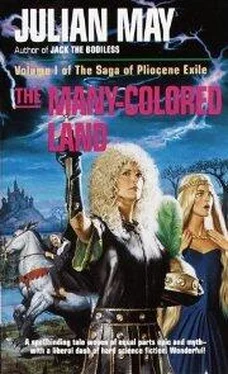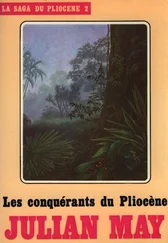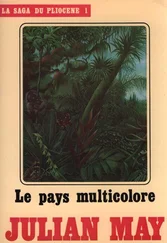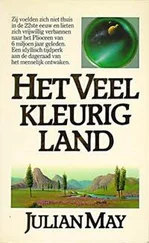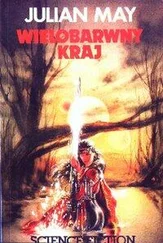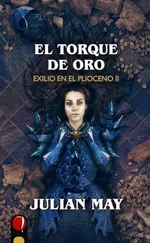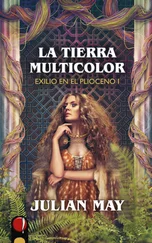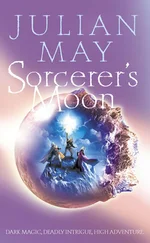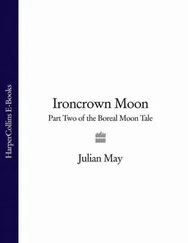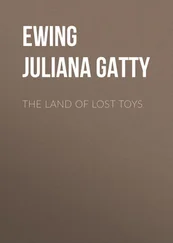Julian May - The Many-Coloured Land
Здесь есть возможность читать онлайн «Julian May - The Many-Coloured Land» весь текст электронной книги совершенно бесплатно (целиком полную версию без сокращений). В некоторых случаях можно слушать аудио, скачать через торрент в формате fb2 и присутствует краткое содержание. Год выпуска: 1985, ISBN: 1985, Издательство: Del Rey, Жанр: Фантастика и фэнтези, на английском языке. Описание произведения, (предисловие) а так же отзывы посетителей доступны на портале библиотеки ЛибКат.
- Название:The Many-Coloured Land
- Автор:
- Издательство:Del Rey
- Жанр:
- Год:1985
- ISBN:0345324447
- Рейтинг книги:4 / 5. Голосов: 1
-
Избранное:Добавить в избранное
- Отзывы:
-
Ваша оценка:
- 80
- 1
- 2
- 3
- 4
- 5
The Many-Coloured Land: краткое содержание, описание и аннотация
Предлагаем к чтению аннотацию, описание, краткое содержание или предисловие (зависит от того, что написал сам автор книги «The Many-Coloured Land»). Если вы не нашли необходимую информацию о книге — напишите в комментариях, мы постараемся отыскать её.
Won Locus Award for Best SF Novel in 1982.
Nominated for Hugo Award for Best Novel in 1982.
The Many-Coloured Land — читать онлайн бесплатно полную книгу (весь текст) целиком
Ниже представлен текст книги, разбитый по страницам. Система сохранения места последней прочитанной страницы, позволяет с удобством читать онлайн бесплатно книгу «The Many-Coloured Land», без необходимости каждый раз заново искать на чём Вы остановились. Поставьте закладку, и сможете в любой момент перейти на страницу, на которой закончили чтение.
Интервал:
Закладка:
When Aiken Drum was thirteen, he had worked with a crew of civil engineers, diverting the course of a small waterfall so that it would help feed the newly completed Old Man of the Mountain Reservoir. Late one night, Aiken and a gang of young confederates stole quantities of cement and conduit and modified the rocks at the rim of the falls. Dawn on Dalriada revealed a passable simulacrum of gigantic male urogenital organs, taking a leak into the reservoir forty meters below.
When Aiken Drum was fourteen, he stowed his small body away on a luxury liner bound for Caledonia. The passengers were victimized by thefts of jewelry, but monitors showed that no human thief had entered their rooms. A search of the cargo deck revealed the young stowaway and the radio-controlled robot “mouse” he had sent foraging, programmed to sniff out precious metals and gemstones that the boy calmly admitted he planned to fence in New Glasgow.
They sent him home, of course, and the behaviorists had still another shot at redirecting Aiken’s errant steps toward the narrow road of virtue. But the conditioning never took.
“He breaks your heart,” one psychologist admitted to another. “You can’t help but like the kid, and he’s got a brilliantly inventive mind in that troll body of his. But what the hell are we going to do with him? The Galactic Milieu just has no niche for Till Eulenspiegel!”
They tried redirecting his narcissism into comedic entertainment, but his fellow troupers nearly lynched him when he queered their acts with practical jokes. They tried to harness his mechanical ability, but he used the engineering school facilities to build outlaw black boxes that gave illegal access to half the computerized credit systems in the Sector. They tried metapsychic deep-redact and deprivation conditioning and multiphase electroshock and narcotherapy and old-time religion.
Aiken Drum’s wickedness triumphed over all.
And so, when he reached an unrepentant twenty-first birthday, Aiken Drum was confronted with a multiple-choice question, the answer to which would shape his future:
As a confirmed recidivist, counterproductive to the ultimate harmony of the Galactic Milieu, which of these options do you choose?
a. Permanent incarceration in Dalriada Correctional Institution
b. Psychoturgical implant of a docilizarion unit
c. Euthanasia
“None of the above,” said Aiken Drum. “I choose Exile.”
CHAPTER SEVEN
Sister Annamaria Roccaro first met Claude when he brought his dying wife to the Oregon Cascade Hospice.
Both of the old people had been salvage exopaleontologists, Claude Majewski specializing in macrofossils and Genevieve Logan in micros. They had been married for more than ninety years and one rejuvenation, and together they had surveyed the extinct life-forms of more than two score planets colonized by humanity. But Genevieve had grown weary at last and refused a third lifetime, and Claude had concurred in her decision, as he had throughout most of their time together. They stayed in harness as long as possible, then spent a few declining years in their cottage on the Pacific Coast of Old World North America.
Claude never thought about the inevitable end until it was upon them. He had a vague notion that they would someday drift off quietly together in their sleep. The reality, of course, was less tidy. Claude’s Polish peasant body proved in the end to have a much greater staying power than that of his Afro-American wife. The time came when Genevieve had to go to the Hospice with Claude accompanying her. They were welcomed by Sister Roccaro, a tall and open-faced woman, who took personal charge of the physical and spiritual consolation of the dying scientist and her husband.
Genevieve, riddled with osteoporosis, partly paralyzed and dulled by a series of small strokes, was a long time passing. She may have been aware of her husband’s efforts to comfort her, but she gave very little evidence of it. Suffering no pain, she spent her days sedated in a dreamy reverie or in sleep. Sister Roccaro found that more and more of her professional efforts were devoted to dealing with Claude, who was frustrated and deeply depressed by his wife’s slow drift toward life’s end.
The old man was still physically sturdy at the age of one hundred and thirty-three, so the nun often took him walking in the mountains. They tramped the misty evergreen forests of the Cascade Range and fished for trout in streams running off the Mount Hood glaciers. They checklisted birds and wild-flowers as high summer came on, climbed the flanks of Hood, and spent hot afternoons sitting in the shade on the mountainside without speaking, for Majewski was unable or unwilling to verbalize his grief.
One morning in the early Jury of 2110, Genevieve Logan began to sink quickly. She and Claude could only touch one another now, since she could no longer see or hear or speak. When the sickroom monitor showed that the old woman’s brain had ceased to function, the Sister celebrated the Mass of Departure and gave the last anointing. Claude turned off the machines himself and sat beside the bed holding Genevieve’s skeletal brown hand until the warmth left it.
Sister Roccaro gently pressed the wrinkled coffee-colored lids down over the dead scientist’s eyes. “Would you like to stay with her awhile, Claude?”
The old man smiled absently. “She’s not here, Amerie. Would you walk with me if no one else needs you for a while? It’s still early. I think I’d like to talk.”
So they put on boots and went out again to the mountain, the trip via egg taking only a few minutes. Parking at Cloud Cap, they ascended Cooper Spur by an easy trail and came to a halt below Tie-in Rock, on a ridge at the 2800-meter level. They found a comfortable place to sit and took out canteens and hutches. Just below was Hood’s Eliot Glacier. To the north, beyond the Columbia River Gorge, were Mount Adams and distant Rainier, both snow-crowned like Hood. The symmetrical cone of Mount St. Helens, to the west downriver, sent up a gray plume of smoke and volcanic steam.
Majewski said, “Pretty up here, isn’t it? When Gen and I were kids, St. Helens was cold. They were still logging the forests. Dams blocked the Columbia, so the salmon had to climb upstream on fish ladders. Port Oregon Metro was still called Portland and Fort Vancouver. And there was a little smog, and some overcrowding if you wanted to live where the jobs were. But all in all, life was pretty good out here, even in the bad old days when St. Helens erupted. It was only toward the very end, before the Intervention when the world was running out of energy and the technoeconomy collapsing, that this Pacific North-west country started to share some of the griefs of the rest of the world.”
He pointed eastward, toward the dry canyons and the high-desert scrub of the old lava plateau beyond the Cascades.
“Out there lie the John Day fossil beds. Gen and I did our first collecting there when we were students. Maybe thirty or forty million years ago, that desert was a lush meadowland with forested hills. It had a big population of mammals, rhinos, horses, camels, oreodonts, we call them cookie monsters, and even giant dogs and saber-tooth cats. Then one day the volcanoes began to erupt. They spread a deep blanket of ash and debris all over these eastern plains. The plants were buried and the streams and lakes were poisoned. There were pyroclastic flows, kind of a fiery cloud made of gas and ash and bits of lava, racing along faster than a hundred-fifty kloms an hour.”
He slowly unwrapped a sandwich, bit, and chewed. The nun said nothing. She took off her bandanna head scarf and used it to wipe the sweat from her wide brow.
“No matter how fast or how far those poor animals ran, they couldn’t escape. They were buried in the layers of ash. And then the volcanism stopped. Rain washed away the poisons and the plants came back. After a while, the animals returned, too, and repopulated the land. But the good life didn’t last. The volcanoes erupted again, and there were more showers of ashes. It happened over and over again throughout the next fifteen million years or so. The killing and the repopulating, the shower of death and the return of life. Layer after layer of fossils and ashes were laid down out there. The John Day formation is more than half a klom thick, and there are similar formations above and below it.”
Читать дальшеИнтервал:
Закладка:
Похожие книги на «The Many-Coloured Land»
Представляем Вашему вниманию похожие книги на «The Many-Coloured Land» списком для выбора. Мы отобрали схожую по названию и смыслу литературу в надежде предоставить читателям больше вариантов отыскать новые, интересные, ещё непрочитанные произведения.
Обсуждение, отзывы о книге «The Many-Coloured Land» и просто собственные мнения читателей. Оставьте ваши комментарии, напишите, что Вы думаете о произведении, его смысле или главных героях. Укажите что конкретно понравилось, а что нет, и почему Вы так считаете.
